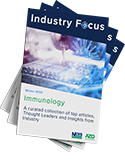A new 'outside-the-box' method of teaching artificial intelligence (AI) models to make decisions could provide hope for finding new therapeutic methods for cancer, according to a new study from the University of Surrey.
Computer scientists from Surrey have demonstrated that an open ended – or model-free – deep reinforcement learning method is able to stabilize large datasets (of up to 200 nodes) used in AI models. The approach holds open the prospect of uncovering ways to arrest the development of cancer by predicting the response of cancerous cells to perturbations including drug treatment.
Immunology eBook

Dr Sotiris Moschoyiannis, corresponding author of the study from the University of Surrey, said:
"There are a heart-breaking number of aggressive cancers out there with little to no information on where they come from, let alone how to categorize their behavior. This is where machine learning can provide real hope for us all.
"What we have demonstrated is the ability of the reinforcement learning-driven approach to address real large-scale Boolean networks from the study of metastatic melanoma. The results of this research have been successful in using recorded data to not only design new therapies but also make existing therapies more precise. The next step would be to use live cells with the same methods."
Reinforcement learning is a method of machine learning by which you reward a computer for making the right decision and punish it for making the wrong ones. Over time, the AI learns to make better decisions.
A model-free approach to reinforcement learning is when the AI does not have a clear direction or representation of its environment. The model-free approach is considered to be more powerful as the AI can start learning immediately without the need of a detailed description of its environment.
Professor Francesca Buffa from the Department of Oncology at Oxford University commented on the research findings:
"This work makes a big step towards allowing prognosis of perturbation on gene networks which is essential as we move towards targeted therapeutics. These results are exciting for my lab as we have been long considering a wider set of perturbation to include the micro-environment of the cell."
The paper has been published in IEEE Transactions on Control of Network Systems.
University of Surrey
Posted in: Device / Technology News | Medical Condition News
Tags: Artificial Intelligence, Cancer, Cell, Gene, Heart, Machine Learning, Melanoma, micro, Oncology, Research, Therapeutics
Source: Read Full Article
